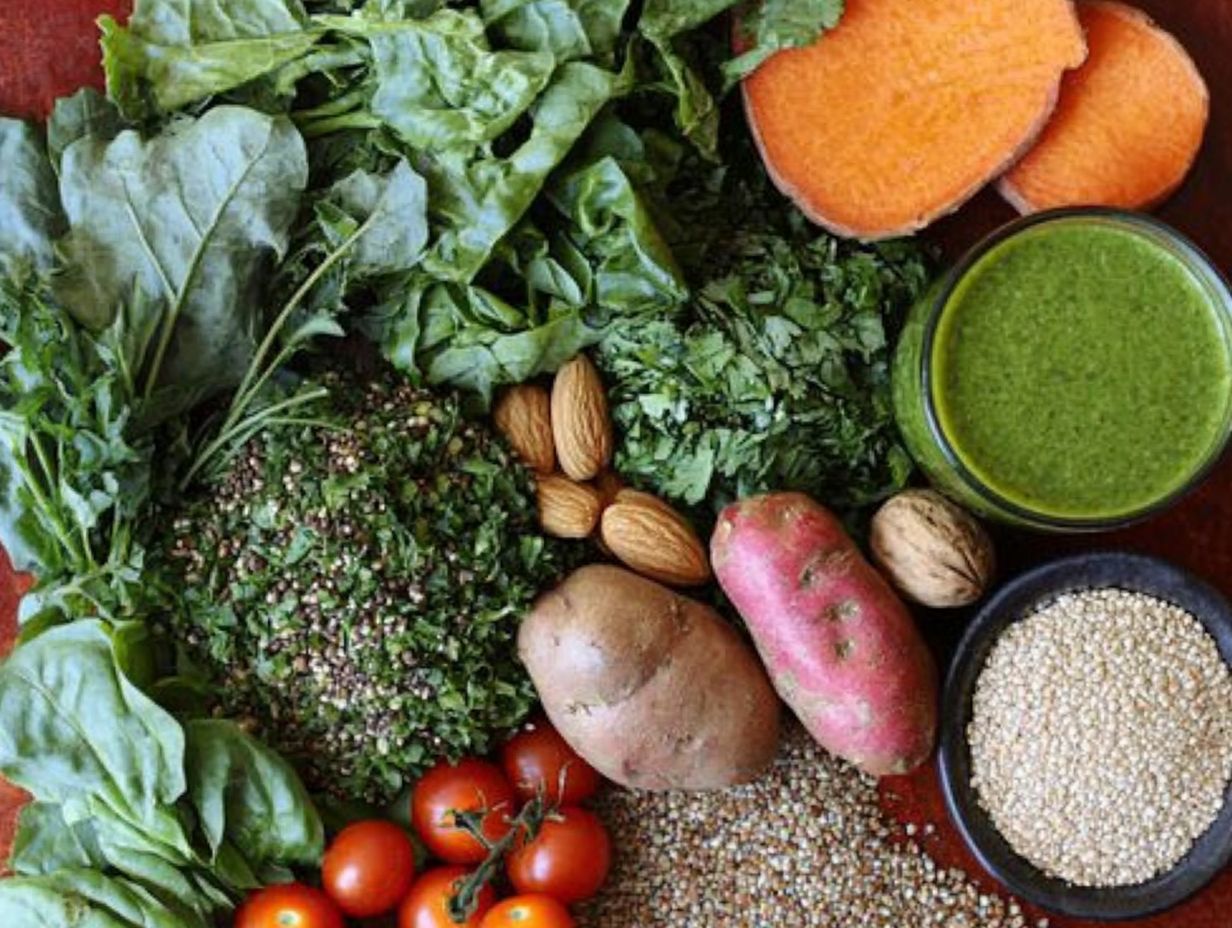Hashimoto’s disease is an autoimmune disorder that affects thyroid function and can result in significant impairments to overall health and quality of life. Adopting a vegan diet may serve as a beneficial complement to treatment for this condition. This article explores the connection between a vegan lifestyle and Hashimoto’s disease, highlighting how plant-based eating can reduce inflammation and promote gut health and nutrient intake. It also discusses both helpful and harmful foods while providing guidance on following a vegan diet to support thyroid health.
What Is Hashimoto’s Disease?

Hashimoto’s disease, also known as Hashimoto’s thyroiditis, is a chronic and progressive condition in which the immune system attacks the thyroid gland. This autoimmune disorder results in chronic inflammation of the gland and a reduction in its function, characterized by decreased production of the thyroid hormones T3 and T4, leading to hypothyroidism.
As a result, this condition frequently leads to hypothyroidism, which can manifest through various symptoms, including fatigue, weight gain, and cold intolerance. Ultimately, Hashimoto’s disease can significantly impact metabolic rates and overall health.
What Is a Vegan Diet?
A vegan diet is a plant-based eating pattern that excludes all animal products, including meat, dairy, and eggs. Instead, it focuses on whole foods such as fruits, vegetables, grains, legumes, nuts, and seeds, which provide a wide range of essential nutrients, including those necessary for proper thyroid function.
This dietary approach is often promoted for its numerous health benefits, including effective weight management, improved heart health, and a reduced risk of chronic diseases. However, it is crucial to be mindful of potential nutrient deficiencies that may occur without careful planning.
How Does a Vegan Diet Affect Hashimoto’s Disease?
The relationship between a vegan diet and Hashimoto’s disease is complex, presenting both positive and negative implications for thyroid health, particularly concerning iodine intake and potential nutrient deficiencies.
Some studies suggest that a vegan diet rich in anti-inflammatory foods may benefit individuals with Hashimoto’s by reducing inflammation and enhancing gut health. However, it is essential to consider the specific nutrient needs of those with this condition, as a vegan diet may lead to deficiencies in iodine, calcium, and vitamin B12, all of which are critical for proper thyroid function and managing hypothyroidism.
1. Reduces Inflammation
The most significant advantage of a vegan diet for individuals with Hashimoto’s disease is its potential to reduce inflammation in the body. Inflammation is a primary factor in autoimmune diseases, and a vegan diet that emphasizes whole plant foods rich in antioxidants and anti-inflammatory properties may alleviate the chronic inflammation associated with Hashimoto’s disease, thereby improving thyroid function and overall health.
Some of the most beneficial foods for this purpose include:
- Leafy greens
- Berries
- Nuts
- Seaweed and soy products
Leafy greens, such as kale and spinach, are rich in vitamins A, C, and K, which can help support the immune system. Berries, including blueberries and strawberries, contain high levels of anthocyanins that can help combat oxidative stress and inflammation. Additionally, seeds like chia and flaxseeds provide omega-3 fatty acids, which further aid in reducing inflammatory markers.
Research indicates that diets rich in these components can lower pro-inflammatory cytokines, offering a protective effect against the symptoms of Hashimoto’s disease. Moreover, a plant-based diet contributes to overall well-being, resulting in increased energy and improved health.
2. Improves Gut Health
A vegan diet offers significant benefits for gut health, which is particularly critical for individuals with Hashimoto’s disease, as gut health is closely linked to immune function and inflammation.
The high fiber content of a vegan diet provides a variety of nutrients from fruits, vegetables, and whole grains, promoting a healthy gut microbiome. This improvement may enhance nutrient absorption and help alleviate the nutrient deficiencies commonly associated with this autoimmune disorder.
Research, including a review article by Anna Bäuerl et al. published in the journal Microorganisms, highlights the importance of a diverse gut microbiome in regulating immune responses, which can be beneficial for those with autoimmune diseases. The authors point out that diets rich in phytonutrients—plant-based micronutrients—can positively affect the immune system, potentially reducing the risk of developing autoimmune conditions.
A specific study referenced in Nature found that a high diversity of plant foods correlates with greater counts of beneficial bacteria. For individuals with Hashimoto’s disease, adopting a vegan lifestyle may help relieve symptoms, as certain phytonutrients have demonstrated anti-inflammatory effects and can enhance thyroid function.
By improving gut microbiome health through a vegan diet, patients may stabilize their condition and enhance their overall well-being.
3. Increases Nutrient Intake

A well-planned vegan diet can significantly enhance nutrient intake, which is essential for maintaining thyroid health in patients with Hashimoto’s disease. By incorporating a wide variety of plant-based foods, vegans can increase their intake of crucial nutrients, including healthy fats, fiber, and antioxidants.
It is important to be mindful of sources of calcium, iodine, and vitamin B12 to prevent deficiencies that could negatively affect thyroid function. This approach not only promotes overall health but also aids in managing symptoms of autoimmune diseases like Hashimoto’s.
For instance, consuming foods rich in iron and essential fatty acids, such as leafy greens, nuts, seeds, and legumes, has been shown to be beneficial. Additionally, nutrient density can be further improved by including B12-fortified foods or algae-based iodine supplements.
Utilizing diverse protein sources such as quinoa, hemp seeds, tempeh, and soy helps meet the body’s amino acid requirements while ensuring a balanced distribution of macronutrients, which is essential for maintaining thyroid health and metabolism rates.
What Foods Should Be Included in a Vegan Diet for Hashimoto’s?
A well-balanced vegan diet for individuals with Hashimoto’s disease should incorporate a diverse range of foods that supply essential nutrients and promote thyroid health.
Key food groups to include are:
- Plant-based protein sources
- Healthy fats
- Whole grains
- A wide variety of fruits and vegetables
- Fermented foods that support gut health
This combination can help reduce inflammation and enhance overall well-being.
1. Plant-Based Protein Sources
Incorporating plant-based protein sources into a vegan diet is particularly important for individuals with Hashimoto’s disease, as proteins play a crucial role in tissue repair and metabolic processes.
Foods that are high in plant-based protein, such as legumes, beans, lentils, nuts, and seeds, are vital for those with Hashimoto’s disease, as they help prevent the nutrient deficiencies often associated with restrictive diets.
Individuals with this autoimmune condition need to ensure they maintain a balanced intake of protein to support their immune systems and energy levels.
High-protein plant foods can easily be integrated into daily meals; for example:
- Chickpeas can be added to salads,
- Quinoa can serve as a base for veggie bowls,
- A handful of nuts and seeds makes for a quick and nutritious snack.
Additionally, tofu, tempeh, and other soy products are excellent high-protein alternatives to meat and can be used in stir-fries and soups, contributing to healthy fats and thyroid health.
By being mindful of these alternatives, individuals with Hashimoto’s disease can enhance their diets in a way that prioritizes both health and enjoyment, potentially reducing dependence on thyroid medication.
2. Healthy Fats
Healthy fats are essential in a vegan diet for maintaining thyroid health, particularly for individuals with Hashimoto’s disease. These fats aid in the absorption of fat-soluble vitamins and are necessary for hormone production.
Sources of healthy fats, such as avocados, nuts, and seeds—especially Omega-3-rich foods like flaxseeds and walnuts—play a vital role in balancing inflammation within the body. Omega-3 fatty acids are particularly important as they can significantly reduce inflammation and may support thyroid function.
For those following a vegan lifestyle, incorporating sources of Omega-3 fatty acids, including chia seeds, hemp seeds, and algae oil, into meals is crucial. These sources not only provide essential fatty acids but also enhance overall nutrition.
Consuming about 1-2 tablespoons of flaxseed or chia seeds daily is an easy way to meet this nutritional need. Including a variety of healthy fats in the diet not only supports thyroid health but also promotes overall well-being.
3. Whole Grains
Whole grains are a crucial component of a vegan diet, offering essential nutrients and fiber that are vital for maintaining thyroid health and supporting overall wellness.
By incorporating a variety of whole grains such as quinoa, brown rice, oats, and whole wheat, individuals can enhance their nutrient intake and reduce the risk of deficiencies, especially those dealing with Hashimoto’s disease. These grains are rich in vitamins and minerals, and they provide healthy carbohydrates that help sustain energy levels throughout the day, which is particularly important for individuals managing thyroid conditions.
For example, quinoa is a complete protein, while brown rice serves as an excellent base for hearty meals.
To easily integrate these nutritious whole grains into your diet, consider starting your day with oatmeal topped with fresh fruits and nuts, or prepare a stir-fry using brown rice as a filling side dish. Such dietary patterns are also ideal for those following vegetarian diets, which have shown benefits in managing conditions like Hashimoto’s thyroiditis.
Such simple additions can significantly contribute to a balanced Vegan diet and promote better thyroid function over time by supporting adequate calcium intake and addressing potential iodine deficiency.
4. Fruits and Vegetables

Fruits and vegetables are essential components of a Vegan diet, offering a wide range of vitamins, minerals, and antioxidants crucial for overall health, particularly for individuals with Hashimoto’s disease, as these nutrients support the management of thyroid hormones like T3 and T4.
The high antioxidant content in many fruits and vegetables helps reduce oxidative stress and inflammation, which are important factors in managing autoimmune conditions like Hashimoto’s thyroiditis. Including a diverse array of produce can enhance general health and address specific nutritional needs, such as supporting thyroid function and preventing nutritional deficiencies.
It is important to consider the goitrogen content in certain foods; for example, cruciferous vegetables like kale and broccoli can provide essential nutrients while still being mindful of their effects on the thyroid.
Colorful fruits such as berries and citrus fruits, which are rich in vitamin C and flavonoids, can boost immune function and help reduce inflammation. Additionally, sweet potatoes, rich in beta-carotene, further enhance antioxidant levels.
By incorporating a wide variety of fruits and vegetables, individuals on a vegan diet can achieve a healthy and balanced nutrient profile essential for optimal thyroid function.
5. Fermented Foods
Incorporating fermented foods into a Vegan diet can significantly improve gut health, which is particularly beneficial for individuals with Hashimoto’s disease. This improvement facilitates better nutrient absorption, including important nutrients like Omega-3s and Vitamin B12, and enhances immune function.
Foods such as sauerkraut, kimchi, and plant-based yogurts are rich in probiotics, which help regulate the gut microbiome and may reduce inflammation associated with autoimmune diseases. This balanced gut environment is crucial for those with Hashimoto’s, as fluctuations in hormone levels can affect digestive health.
Additionally, foods like kombucha, miso, and tempeh provide extra sources of beneficial bacteria, contributing to a healthy gut ecosystem.
Individuals can easily include these foods in their meals; for example, adding kimchi to grain bowls or enjoying miso soup as a warming appetizer. Vegan-friendly yogurt can make for a delightful midday snack when paired with fruits, helping to strengthen gut flora and create a well-rounded health management system that is both effective and enjoyable.
What Foods Should Be Avoided in a Vegan Diet for Hashimoto’s?
A vegan diet can be beneficial for individuals with Hashimoto’s disease; however, certain foods should be avoided to reduce the risk of symptom exacerbation and effectively manage thyroid function.
It is advisable to limit or eliminate the following:
- Processed foods
- Gluten-containing grains
- Soy products
- Sources of excess iodine
These can negatively affect thyroid health and hormone levels.
1. Processed Foods
Processed foods can be detrimental to overall health, particularly for those with Hashimoto’s disease. These foods are often high in unhealthy fats, added sugars, and preservatives, which can exacerbate inflammation and lead to nutrient deficiencies.
By avoiding processed foods and opting for whole, natural ingredients, individuals can better support their thyroid health and overall well-being.
Common processed foods to avoid include:
- sugary snacks
- refined grains
- ready-to-eat meals
As they can worsen symptoms and impede healing. Instead, individuals should consider healthier alternatives such as fresh fruits, vegetables, whole grains like quinoa, and lean proteins, which nourish the body and help reduce inflammation.
2. Gluten
Individuals with Hashimoto’s disease may experience worsening symptoms and heightened autoimmune responses when consuming gluten. As a result, it is often advisable to restrict or eliminate gluten-containing grains from their diets. This sensitivity can negatively impact thyroid health and the body’s ability to produce hormones, prompting many to opt for gluten-free choices within their vegan diets.
Key considerations regarding the link between gluten and Hashimoto’s disease include the following:
- Choosing gluten-free grains such as quinoa, millet, and buckwheat can help maintain a balanced nutritional profile without sacrificing taste or variety.
- It is essential to carefully consider nutrient sources to ensure adequate intake of iron, calcium, and B vitamins, among others.
- Additionally, incorporating a diverse array of fruits, vegetables, legumes, and gluten-free whole grains can promote overall health while effectively managing the challenges associated with an autoimmune disease.
3. Soy

Soy consumption is a controversial choice for individuals with Hashimoto’s disease due to its phytoestrogens, which may negatively impact thyroid hormone levels and interfere with thyroid function, as highlighted by research such as the Adventist Health Study-2.
Therefore, it is important to limit the consumption of soy products in a vegan diet to maintain proper thyroid health and prevent potential complications.
Research indicates that while some individuals with Hashimoto’s can tolerate moderate amounts of soy, others may experience worsened symptoms due to the hormone-disrupting properties of phytoestrogens. As a result, many people seek alternatives that meet both their vegan and thyroid health needs.
Healthy substitutes include:
- Lentils
- Chickpeas
- Quinoa
These provide protein without the adverse effects associated with soy. Additionally, incorporating a variety of nuts and seeds can enhance nutrition and contribute to a well-rounded diet.
4. Excess Iodine
Excessive iodine intake can be dangerous for individuals with Hashimoto’s disease, as it may lead to increased thyroid dysfunction and exacerbate symptoms. Therefore, it is essential to monitor iodine intake in a Vegan diet, ensuring moderate consumption and avoiding unnecessary supplementation, particularly from seaweed and iodine-rich products. Balancing iodine levels is crucial to prevent the risks associated with both iodine deficiency and excess.
Hashimoto’s disease, an autoimmune condition, requires careful management of iodine levels, as both deficiency and excess can adversely affect thyroid function. Individuals with Hashimoto’s should incorporate plant-based sources of iodine, such as iodized salt, and make informed dietary choices to monitor their overall iodine intake.
Additionally, consuming selenium-rich foods, like Brazil nuts, can support thyroid function by helping with the conversion of T4 into active T3. Regular check-ups with healthcare professionals can help ensure optimal iodine levels, contributing to improved thyroid health, even within a vegan diet.
How to Follow a Vegan Diet for Hashimoto’s?
A vegan diet can be healthy for individuals with Hashimoto’s as long as nutritional needs and potential deficiencies are carefully considered.
Therefore, it is advisable for individuals to seek support from a registered dietitian who specializes in plant-based diets. This professional can provide evidence-based, personalized recommendations for meal planning, nutrient intake, and overall dietary strategies.
1. Consult with a Registered Dietitian
The best approach for individuals with Hashimoto’s disease to adopt a Vegan diet is to consult with a registered dietitian. These professionals, often associated with the American Dietetic Association, can provide personalized advice tailored to meet unique nutritional needs and address potential risks of certain deficiencies like iodine deficiency and inadequate Vitamin B12 intake.
They can assist in creating specific meal plans that ensure adequate intake of essential nutrients while avoiding problematic foods. With a strong understanding of the relationship between diet and autoimmune conditions, registered dietitians can help design a vegan lifestyle that is both healthy and sustainable.
By considering individual health factors, they can recommend foods rich in iodine, selenium, and zinc to support overall health. Qualified dietitians can be found by asking healthcare providers for recommendations or through websites that specialize in nutrition expertise.
The benefits of personalized guidance extend beyond meal planning, as individuals often feel more enableed and confident in their dietary choices, leading to improved health outcomes and a better quality of life.
2. Monitor Your Nutrient Intake
Monitoring nutrient intake is crucial for patients with Hashimoto’s disease who follow a vegan diet, as it helps ensure they meet their nutritional requirements and prevents potential deficiencies that could impact thyroid health.
Regularly tracking nutrient levels, particularly for key nutrients such as Vitamin B12, iodine, and Omega-3 fatty acids, is essential for maintaining an adequate diet. Monitoring calcium intake and ensuring sufficient calories are also important to support body mass index and prevent eating disorders. Practical strategies for effective monitoring further contribute to overall wellness.
Utilizing mobile apps for food intake tracking enables patients to easily record their diets and gain a better understanding of their nutrient consumption. Some popular applications include:
- Cronometer
- MyFitnessPal
Both of which have extensive databases to facilitate accurate tracking of macro and micronutrients. Keeping a food diary can also promote mindfulness around eating and help identify and address gaps in nutrient intake.
For those specifically managing Hashimoto’s disease, it is vital to maintain a balanced diet rich in diverse plant-based foods while paying attention to supplementing any necessary nutrients to ensure optimal health.
3. Experiment with Different Recipes
Experimenting with different vegan recipes, especially those rich in fruits and vegetables, is a fun and practical way for individuals with Hashimoto’s disease, also known as Hashimoto’s thyroiditis, to discover new meals that meet their dietary needs while ensuring variety and nutritional adequacy. By creatively preparing meals with a range of ingredients, patients can adhere to a nutrient-rich diet that promotes overall health and well-being. Consulting with a registered dietitian may also help manage any potential nutritional deficiencies.
Vegan Hashimoto’s Diet Recipes for Experimentation: Incorporate the Autoimmune Protocol diet to address potential health concerns.
When exploring vegan meals for those with Hashimoto’s disease and hypothyroidism, it is beneficial to include whole foods that are high in antioxidants and omega-3s, while potentially eliminating foods like soy that might affect thyroid hormones such as T3 and T4. Here are a few examples:
- Quinoa Salad with Roasted Sweet Potatoes and Kale: Quinoa is a gluten-free, high-protein grain, and kale provides a wealth of vitamins and minerals, supporting the body’s iodine needs.
- Chickpea Curry with Turmeric: Chickpeas are an excellent source of protein and fiber, while turmeric, known for its anti-inflammatory properties, enhances the flavor of the dish. This dish aligns well with dietary patterns recommended by the American Dietetic Association and insights from the Adventist Health Study-2.
- Spinach and Avocado Smoothie: The creaminess of the avocado improves the texture of the smoothie, eliminating the need for dairy products. Adding seaweed can enhance iodine content, which is beneficial for those monitoring their thyroid health. Consideration of calories and body mass index can be important in the context of eating disorders.





